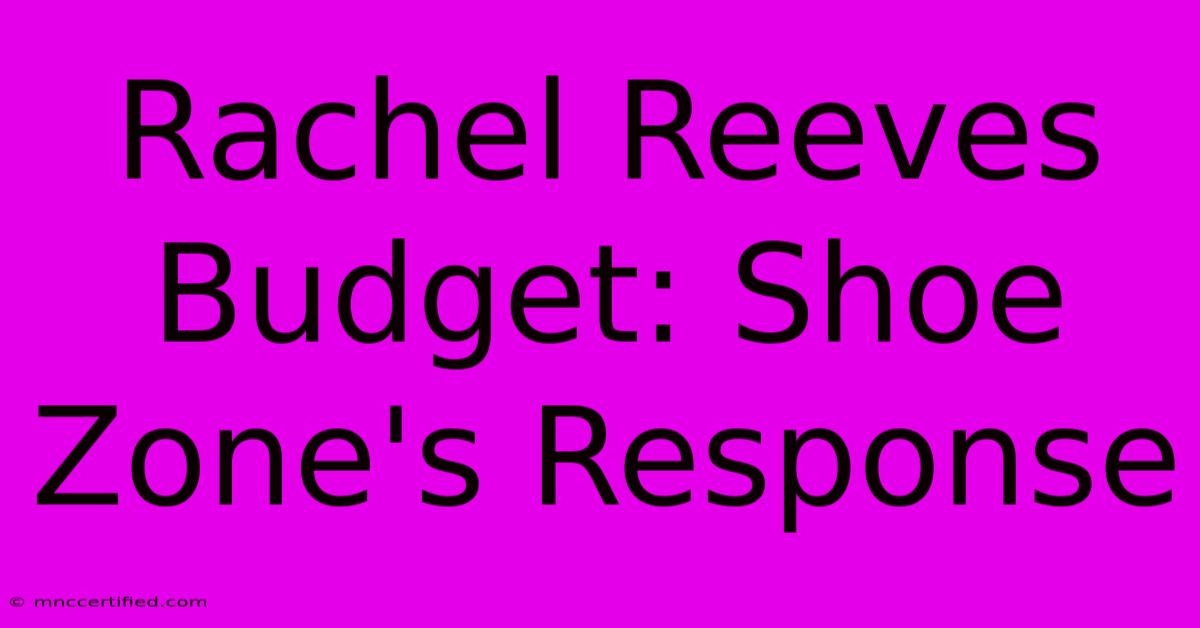Rachel Reeves Budget: Shoe Zone's Response

Table of Contents
Rachel Reeves' Budget: Shoe Zone's Response – A Detailed Analysis
The recent budget announcement by Shadow Chancellor Rachel Reeves has sent ripples across various sectors, and the retail industry is no exception. Shoe Zone, a prominent budget footwear retailer, has been particularly impacted by the proposals, prompting a closer examination of how these policies might affect the company's future and the wider retail landscape. This article delves into the specifics of Reeves' budget, analyzes Shoe Zone's official response, and explores the potential implications for consumers and the business.
Key Points from Rachel Reeves' Budget Proposal
Reeves' budget blueprint focused heavily on cost of living support, aiming to alleviate the financial pressures facing households across the UK. While specifics varied, key elements relevant to Shoe Zone and similar retailers include:
- Increased Corporation Tax: A potential rise in corporation tax directly affects a company's profitability. For Shoe Zone, this could translate to reduced investment capacity, potentially impacting future store expansions or product range developments.
- Minimum Wage Increases: While supporting fair wages is crucial, significant minimum wage hikes could lead to increased operational costs for businesses like Shoe Zone, potentially requiring adjustments to pricing strategies or staffing levels.
- National Living Wage: Similar to minimum wage increases, the implications of a higher National Living Wage are significant, directly impacting labor costs and requiring careful financial management.
Shoe Zone's Official Statement and Reaction
Following the budget announcement, Shoe Zone issued a statement (though the exact wording may vary depending on the source and date), outlining their concerns and perspective on Reeves’ proposals. While a direct quote might require referencing a specific news article or press release, the general sentiment likely centered on the following:
- Concerns regarding increased taxation: Higher corporation tax could squeeze profit margins, hindering investment in growth initiatives.
- Impact of rising labor costs: Balancing fair wages with maintaining price competitiveness for budget-conscious consumers presents a significant challenge.
- Uncertainty about future economic outlook: The overall economic climate, as influenced by the budget, creates uncertainty in predicting future sales and demand.
Analyzing the Impact on Shoe Zone
The impact of Reeves' budget on Shoe Zone will depend on the specifics of the implemented policies. However, potential consequences could include:
- Price Increases: To offset increased operational costs, Shoe Zone might have to raise prices, potentially impacting their value-driven market position.
- Reduced Investment: Lower profits due to higher taxation might mean less investment in new stores, technology upgrades, or staff training.
- Changes to Staffing: The company may need to carefully manage staffing levels to balance rising labor costs with operational efficiency.
- Supply Chain Adjustments: The budget's overall effect on the economy could affect Shoe Zone's supply chain, impacting the availability and cost of materials.
Long-Term Implications and Strategies for Shoe Zone
Shoe Zone, like other retailers, needs to adapt its strategies to navigate the potential challenges presented by Reeves' budget. This might involve:
- Cost optimization: Implementing efficient operational strategies to minimize costs without compromising quality or customer service.
- Enhanced pricing strategies: Exploring flexible pricing models to remain competitive while mitigating the impact of increased operational costs.
- Focus on customer loyalty: Building stronger relationships with customers to ensure repeat business and brand loyalty in a challenging economic environment.
- Technological investment: Investing in efficient technology for inventory management, supply chain optimization, and customer relationship management can also improve profitability.
Conclusion: Navigating the Economic Landscape
Rachel Reeves' budget proposals present both challenges and opportunities for businesses like Shoe Zone. Successfully navigating this new economic landscape requires a proactive and adaptable approach. By carefully managing costs, enhancing efficiency, and focusing on customer relationships, Shoe Zone can hopefully mitigate potential negative impacts and maintain its position within the competitive retail market. The coming months will be crucial in observing how the budget's implementation plays out and how Shoe Zone and other businesses adapt to the changes.

Thank you for visiting our website wich cover about Rachel Reeves Budget: Shoe Zone's Response. We hope the information provided has been useful to you. Feel free to contact us if you have any questions or need further assistance. See you next time and dont miss to bookmark.
Featured Posts
-
Live Stream Arsenal Vs Crystal Palace Carabao Cup
Dec 19, 2024
-
How To Stream Southampton Vs Liverpool
Dec 19, 2024
-
Veteran Qb Bridgewaters Future Uncertain
Dec 19, 2024
-
Fed Cuts Rates Amid Inflation Concerns
Dec 19, 2024
-
Real Madrid Vs Pachuca Fifa Club World Cup
Dec 19, 2024